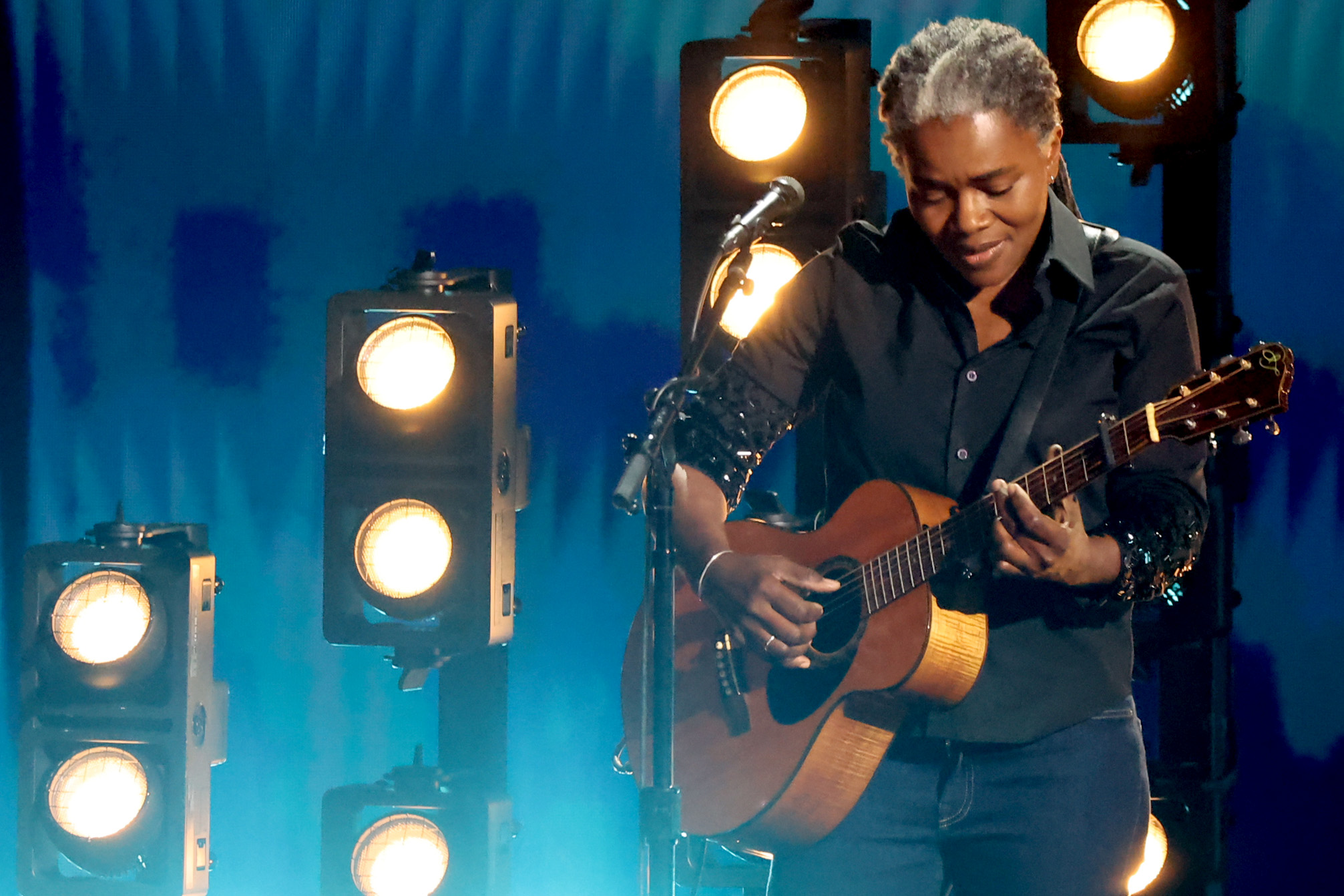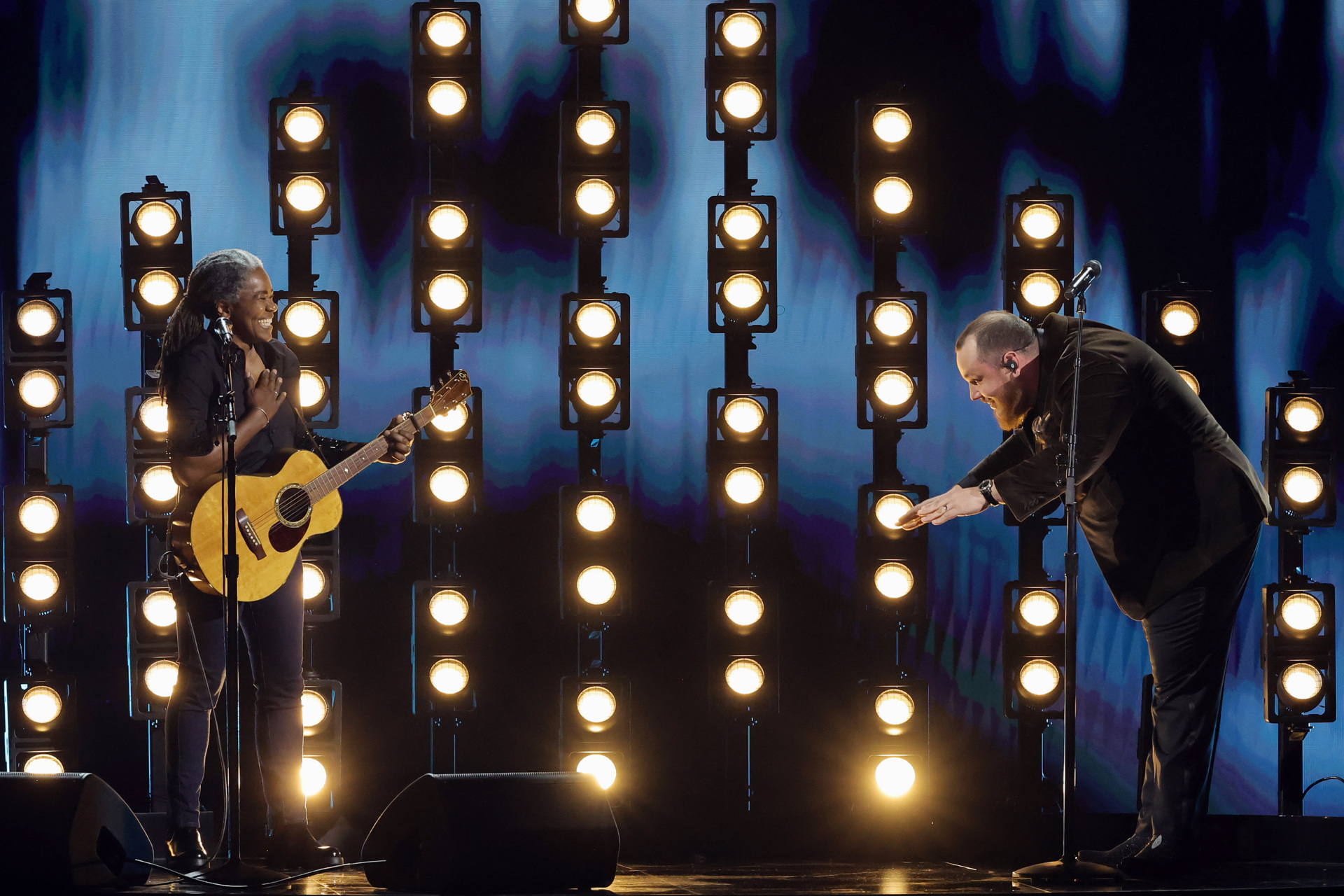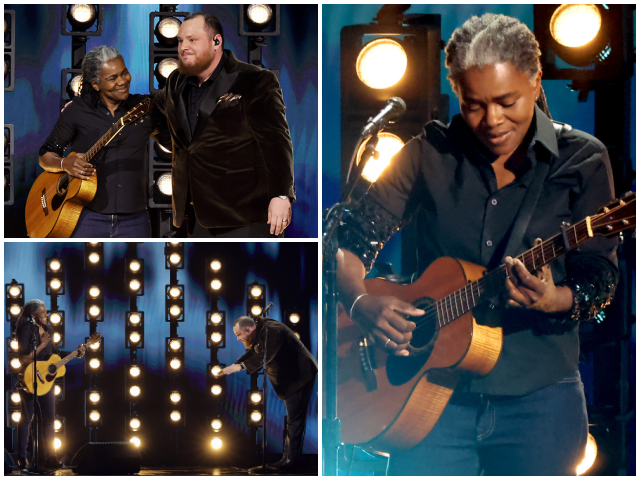Using only her art, the legendary Tracy Chapman took to the Grammy stage Sunday night and made the most American of statements.
The story behind Chapman’s iconic, Grammy-winning hit “Fast Car” dates back 36 years to 1988, when it was first released. She was only 23 then, but in the synthesized-saxophoned eighties, “Fast Car” was something all its own.
The Clevelend-born Chapman was lucky. America was still a young country then, a country eager to embrace The New, an anxious culture always glancing over the shoulder of the latest superstar, eager for whatever was next.
The stagnant America we live in today, a culture crippled by nostalgia that still watches Law & Order, anticipates the next Star Wars movie, attends Rolling Stones concerts, and pays to see an 80-year-old play Indiana Jones was inconceivable then. And so, during a year that gave us “Get Outta My Dreams, Get Into My Car,” “Sweet Child O’ Mine,” Milli Vanilli, and Tiffany, seemingly from nowhere came this beautiful, moving, and vivid folk-rock song, a young woman’s desperate lament to escape the quicksand of poverty and “be someone, be someone.”
Like something from a hokey movie, Chapman’s life changed forever in 1988 during a birthday tribute to Nelson Mandela. At the last second, Stevie Wonder freaked out over a technical mishap and walked off. With only her guitar, a microphone, and talent, Chapman was pushed on stage in front of 72,000 fans expecting Stevie Wonder. And then this happened…
Superstardom and awards followed, as did another big hit in 1997 with “Give Me One Reason.” Through it all, Chapman never lost her poise. On top of her physical beauty, Chapman’s charisma is primarily a product of how we are drawn to her remove. We know she’ll always give us our money’s worth. We also know she’ll never tell us her secrets. She doesn’t need us. She knows who she is. And who she is is none of our business.
Throughout her life, Chapman was having none of it when it came to fame. She kept her personal life personal, quietly supported her causes, and turned down untold riches from rap artists who sought to sample her music — and when Nikki Minaj did so without permission, Chapman sued and won $450,000.
But in the realm of “having none of it,” nothing will ever top the moment when Tracy Chapman’s humanity met America’s modern-day culture — this obscene, cancerous, ignorant, smug, divisive, oversharing, narcissistic, mean-spirited glob of hate and stupidity.

Tracy Chapman performs onstage during the 66th GRAMMY Awards on February 4, 2024, in Los Angeles, California. (Amy Sussman/Getty Images)
According to the legend, many years after it was first released in 1988, “Fast Car” was the first song 33-year-old country superstar Luke Combs fell in love with as a kid. Fast-forward another dozen or so years, and Combs’ cover turned “Fast Car” into a platinum-selling megahit all over again. Chapman’s timeless and poetic plea then went on to win the 2023 Country Music Award for Song of the Year, an award that went to Chapman.
His respect for Chapman and her song is so complete that Combs didn’t change a word, not even the lyric: “And I work in a market as a checkout girl.”
Normal people look at this story and smile. Sadly, the days of normal people controlling the levers of our corporate culture are over, so instead, we got this:
In a Washington Post article … Emily Yahr wrote, “Although many are thrilled to see ‘Fast Car’ back in the spotlight and a new generation discovering Chapman’s work, it’s clouded by the fact that, as a Black queer woman, Chapman, 59, would have almost zero chance of that achievement herself in country music.”
Yahr interviewed Black individuals working in the music industry, who expressed mixed feelings about the situation: They are glad to see Chapman’s music receiving recognition and exerting influenceFast C but they also feel “uneasy” about Combs’ overwhelming success in light of his white male identity.
“On one hand, Luke Combs is an amazing artist, and it’s great to see that someone in country music is influenced by a Black queer woman — that’s really exciting,” Holly G, founder of the Black country music organization Black Opry, told Yahr. “But at the same time, it’s hard to really lean into that excitement knowing that Tracy Chapman would not be celebrated in the industry without that kind of middleman being a white man.”
This is not a debate that takes place in a healthy society. The ignorance and blatant racism is beyond the beyond. What’s especially galling is that those complaining are the ones pretending the success of Combs’s cover song had nothing to do with the black queer woman. Believe me, I could go on, but…
I don’t have to because during Sunday night’s otherwise obnoxious, hateful, and puerile Grammy Awards, Tracy Chapman said everything that needed to be said. After being out of the spotlight for years, she returned for only a few minutes to respond to all this ugliness in the most effective, gracious, and American way imaginable:
Tracy Chapman and Luke Combs – Fast Car#GRAMMYs pic.twitter.com/WWztcov2tJ
— Craig R. Brittain (@RealBrittain) February 5, 2024
With class and elegance, her eyes sparkling with only joy and gratitude, and armed with only her art and artistry, Tracy Chapman grabbed a guitar, stepped to a microphone, and delivered one of the greatest moments in award show history, a moment that said it all.

Tracy Chapman and Luke Combs perform onstage during the 66th GRAMMY Awards on February 4, 2024, in Los Angeles, California. (Kevin Winter/Getty Images for The Recording Academy)
Get a FREE FREE FREE autographed bookplate if you purchase John Nolte’s debut novel, Borrowed Time (Bombardier Books).
Nothing about this novel is predictable or formulaic. Nolte is such a gifted writer and can turn a phrase. The characterizations were so well done that each was a polished little vignette. The characters become deeply imprinted in your mind and compel you to keep reading. The whole book had a very beautiful spiritual undertone and Nolte used themes and symbolism like no recent author I can remember. Some parts of this book are like lyrical poetry. I laughed and cried and was so moved. — Five-Star Review
After your purchase, email JJMNOLTE at HOTMAIL dot COM with your address and any personalization requests.

COMMENTS
Please let us know if you're having issues with commenting.